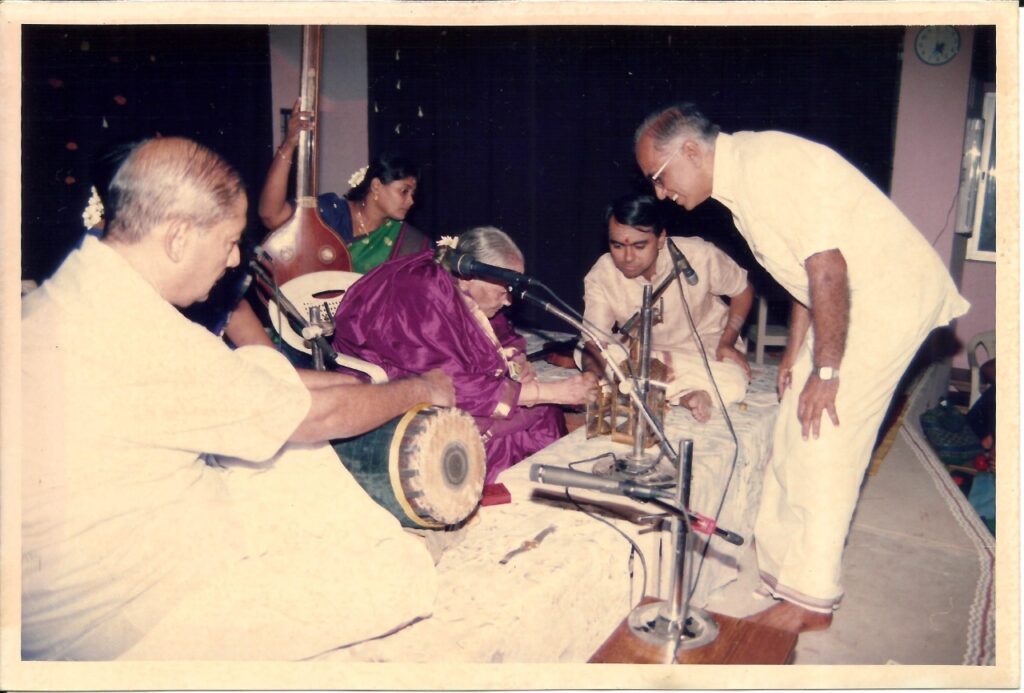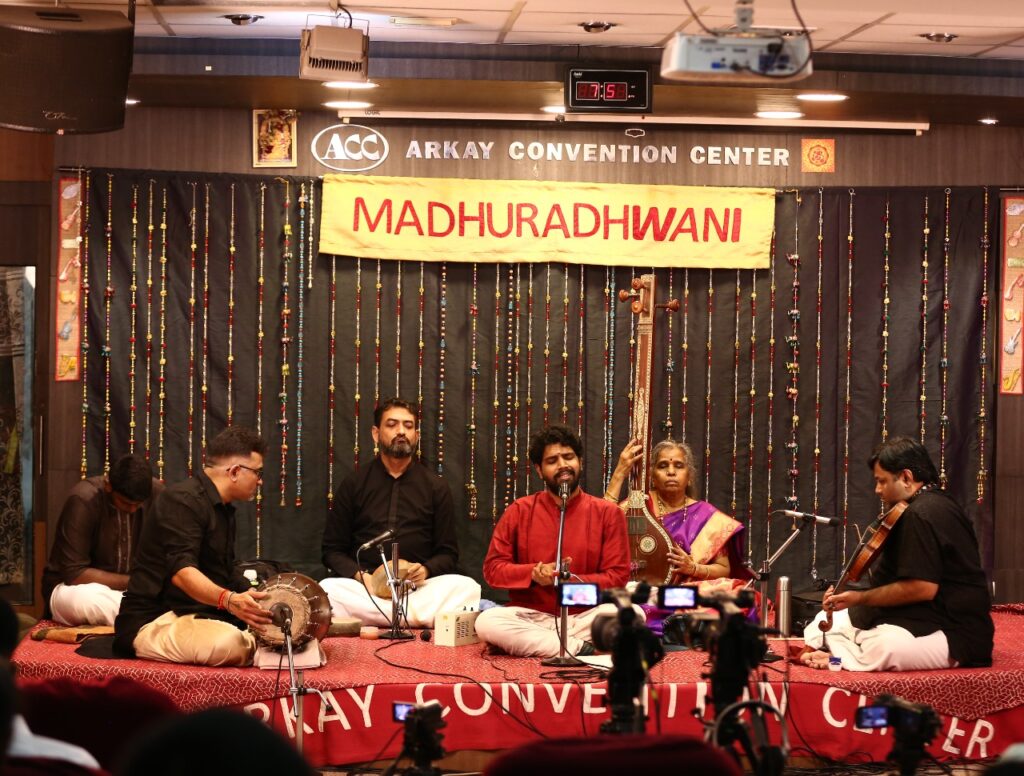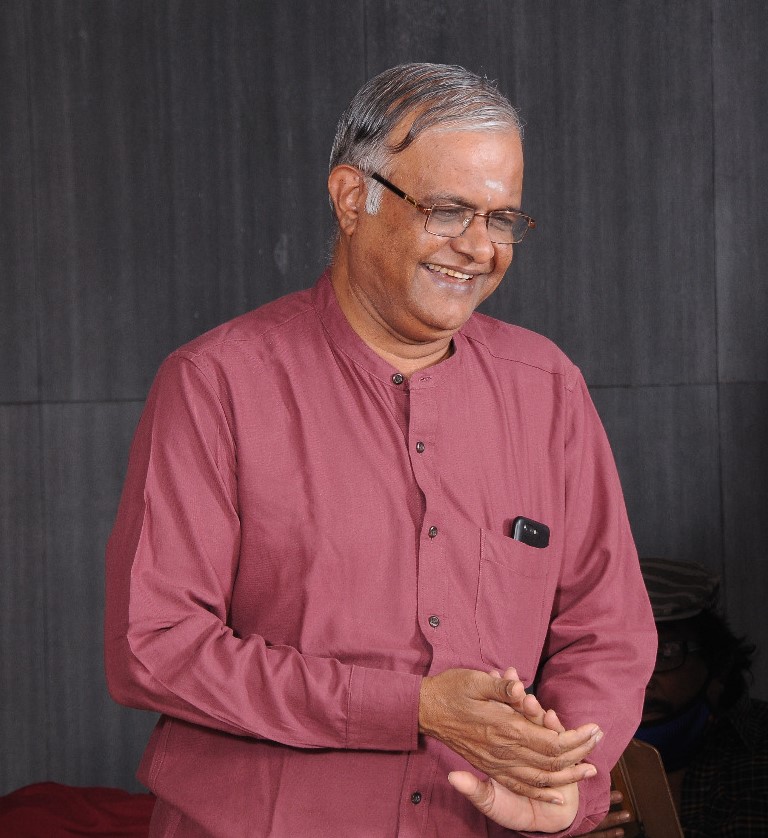Music Uninterrupted
Despite the world of the arts being severely impacted, Jayalakshmi Balakrishnan and Arkay Ramakrishnan each organised hundreds of concerts throughout the pandemic, all free to rasikas, for their respective non-profit organisations Naada Inbam and Madhuradhwani.
A mechanical engineer with a degree in Indian music as well, Jayalakshmi Balakrishnan took on the Naada Inbam baton faithfully from her father, S.V. Krishnan, upon his demise in 2007. Krishnan, the son of a civil engineer, and an electronics engineer himself, had Raga Sudha Hall, the home of Naada Inbam, built to stringent specifications, with the debut program in 1997. The very first program was an ensemble Pancaratna kriti program that featured T.K. Govinda Rao and P.S. Narayanaswamy, among others. The first traditional ‘solo’ concert was a sponsored one which featured D.K. Pattammal accompanied by R.K. Shriramkumar on the violin and I. Sivakumar on the mridangam.
A version of this article appeared in The Hindu newspaper dated January 14th, 2022.

Photo courtesy: Smt. Jayalakshmi Balakrishnan
Naada Inbam’s concerts had always been the traditional kind, with in-person audiences, audio-recorded purely archivally. In 2013, Lalitharam Ramachandran requested Jayalakshmi permission to webcast the concerts for his Parivadini music YouTube channel. After being assured that the artistes’ permission would be sought, the Parivadini live webcast has been a regular feature since, with over 1,500 uploads to date. Naada Inbam closed its doors to physical audiences since the pandemic. “Most of our rasikas are elderly and I am unwilling to risk their health,” Jayalakshmi says. All concerts are now recorded, as a result, and subsequently uploaded on the Parivadini channel, to avoid any quality issues caused by live streaming. About 200 concerts have been recorded during the pandemic alone.
She explains that Naada Inbam’s focus on senior artistes and committed youngsters from solid patantara was her father’s heart’s desire. Besides presenting performances of veterans galore, including Thanjavur Sankara Iyer, Kalpagam Swaminathan, T.K.Govinda Rao and T.N. Krishnan, many currently popular artistes had their start at Naada Inbam. Jayalakshmi has since exposed several newcomers to the listening public, while continuing lecture-demonstrations by musicians of scholarly bent.

Photo courtesy: Sri. Nick Haynes.
The pandemic has forced Jayalakshmi to stop featuring regular seniors like R. Vedavalli, Suguna Varadachari, Rama Ravi, Neela Ramgopal, Seetha Narayanan, Seetha Rajan etc. since she is uncompromising on their safety. “I have never had a series sans seniors and it feels peculiar,” says Jayalakshmi who has learned music directly from Delhi S. Gopalakrishnan, T.K. Govinda Rao, Ranganayaki Parthasarathy and the Kannan Brothers among others.
Sekhar (M. Chandrasekharan), Jayalakshmi’s right-hand man, handles the setting up the stage, the mics, the cameras and the sound balancing during recordings. He is periodically assisted by R. Shiva, Jayalakshmi’s nephew. To provide a better user experience, Naada Inbam has invested in both a four track digital audio recorder and two amateur cameras. Besides actively supervising, Jayalakshmi now has the additional task of painstaking audio and video editing which takes her at least 4-5 hours of processing for each approximately 2-hour recording.
Naada Inbam’s main funding has come from renting Raga Sudha Hall for private functions and an intermittent grant from the Government of India’s Ministry of Culture. During the pandemic, music connoisseurs are arranging regular concerts in the memories of loved ones. Artistes renting the hall to record programs for off-city and international organisations has been a new source of covering expenses in recent times.
Arkay Ramakrishnan, a banker turned stockbroker, began Madhuradhwani in 2010, inaugurating the banner itself two years later. While he himself has not learned music, Ramakrishnan’s interest stems from his late father who was a Sangeetha Bhooshanam from Annamalai University and had settled down in Krishnagiri as a landlord who also taught music. “I spent over 40 lakh rupees converting a large portion of my office into a sound-proof space with the latest audio technology, suitable for small chamber concerts.” He immediately found takers amongst musical organisations. He invited many senior musicians himself to perform to live audiences, including N. Ramani, Anayampatti Ganeshan and M. Chandrasekaran. After video recording programs initially, in 2013, he switched to live webcasting most concerts unto YouTube, which he has continued to date. “I have webcast over 2,500 concerts since 2013,” he says.

Photo courtesy: Sri. Rajappane Raju.

Photo courtesy: Sri. Rajappane Raju.
Madhuradhwani invited footfall for their concerts during the pandemic too, whenever legally permitted. During the sporadic total lockdowns of 2020, Ramakrishnan took to releasing his earliest recorded concerts or calling only artistes in and livestreaming those performances sans any audiences. He selects performers based on his own assessments and says that he conducted 120 concerts this season alone, with around 200-250 annually on average. “I look for seniors not given opportunities elsewhere – this year, for example, I was the only one to feature O.S. Thiagarajan, T.V. Sankaranarayanan and Madurai G.S. Mani.” He says he also invites artistes like Sankari Krishnan, Kasturi Rangan and Swarna Rethas who have been learning for years but do not perform much, and several youngsters infrequently seen elsewhere. Ramakrishnan is proud of the many single mic concerts he has organised and several 4 hour programs too.
Much of the funding for the programming comes from renting out the hall, and donations from rasikas. The pandemic has seen rental revenues come down. “I cover any shortfalls from my personal funds.” He invested in more equipment of late. “From one camera, we now have four, allowing for picture-in-picture and close-ups and we also got a digital mixer.” The hall set-up, including sound mixing, is handled by Ravi, a long-term employee, with input from Bharath Kumar, Ramakrishnan’s son.
The pandemic brought in significant operational changes for Naada Inbam and required quick thinking for Madhuradhwani, but the continued persistence of both organisations at a challenging time has enriched Carnatic listeners.
Related Links: